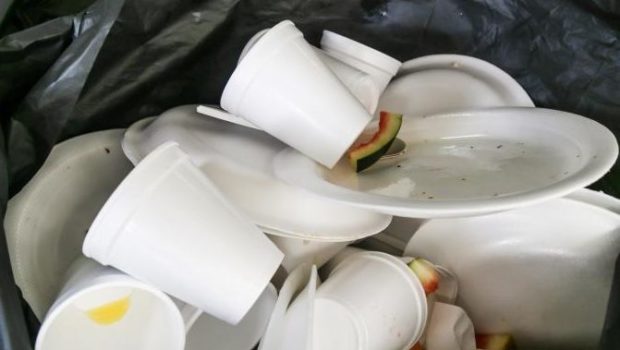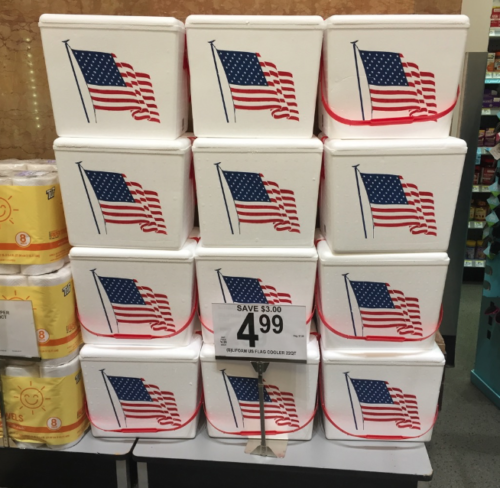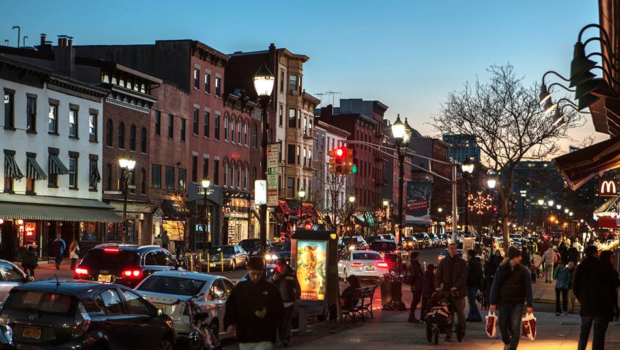
TO THE OCEANS WHITE WITH FOAM: Hoboken Explores Stronger Plastic Bag Ban and Takes Aim at Single-Use Styrofoam
Given its location at the mouth of the Hudson River, Hoboken has started to take its commitment to clean oceans more seriously with the adoption of more and more environmentally friendly policies.
The City’s ban on single-use plastic bags went into effect in January—not without considerable consternation from residents and business owners. And while the majority of business decided to comply with the overall intent of the law—removing the nearly 500 polyethylene plastic bags per person per year from entering our ecosystem—others, primarily chain retailers, sought to exploit a confounding loophole in the legislation and simply offer thicker plastic bags.

Under the current regulations, retail and food establishments are permitted to use reusable plastic bags, which must be at least 2.25 milliliters in width, can carry a minimum of 22 pounds, and can be used at least 125 times, among other regulations.
Newly proposed legislation, sponsored by Hoboken Councilman Jim Doyle, could update the single-use plastic bag ordinance to include a full ban on all carry-out plastic bags, while also targeting single-use Expanded Polystyrene (EPS), commonly known as styrofoam.
“Styrofoam isn’t biodegradable, can’t be recycled, and is a threat our environment and health,” said Hoboken Mayor Ravi Bhalla. “Hoboken is committed to environmental sustainability, and this proposed ban will allow us to do our part to reduce harmful landfill waste and encourage the use of safer alternatives.”

The U.S. Department of Health and Human Services has added styrene to its list of known or possible carcinogens. Because styrofoam can last in landfills for 500 years or more, it has been banned in other cities—including New York City, San Francisco and Washington.
The ban will impact a number of food retailers, who currently use styrofoam for take-out or delivery. However, many restaurants have weaned themselves off the substance over the years, in response to consumer demands or their own commitment to finding better alternatives for EPS.
As for plastic bags, the resistance to change for some retailers has been a bit more stubborn.
“The new 10-cent reusable, recyclable and cleanable bag is an inexpensive option at checkout for customers who forget to bring their own reusable totes to the store,” said Karen O’Shea, a Corporate Communications representative for ShopRite, in a February article. “These durable bags can hold more groceries than single-use bags and can be used over and over again. They can also be wiped down with disinfectant cloths. This information is printed on the bag to inform customers.”

As off press time, ShopRite continues to use those bags—as does it’s competitor, Acme, and other retailers in Hoboken.
Reusable or not, plastic bags are very dangerous for sea life—especially dolphins, seals or turtles—as they are the most likely to mistake the plastic bag for food. Provided they don’t asphyxiate from initially ingesting the bag, they’re facing slow and painful death from toxicity or intestinal blockage.
According to the proposed ordinance, Hoboken businesses would have six months to comply with the new rules and regulations. The ordinance will be considered for second and final reading by the City Council on August 7.

***

 Previous Article
Previous Article Next Article
Next Article Hoboken Catholic Academy Awarded “Blue Ribbon School” Status for 2017
Hoboken Catholic Academy Awarded “Blue Ribbon School” Status for 2017  RED MENACE: 17 Arrested as SantaCon Punches, Spits in the Face of Hoboken
RED MENACE: 17 Arrested as SantaCon Punches, Spits in the Face of Hoboken  FEATURED PROPERTY: 35 Benjamin Drive, Springfield | 4BR/2.5BA Colonial | $669,000
FEATURED PROPERTY: 35 Benjamin Drive, Springfield | 4BR/2.5BA Colonial | $669,000  FEATURED PROPERTY: 244 Milltown Road, Springfield; 3BR/2BA — $409,000
FEATURED PROPERTY: 244 Milltown Road, Springfield; 3BR/2BA — $409,000  hOMES: Weekly Insight Into Hoboken & Jersey City Real Estate Trends | January 8, 2021
hOMES: Weekly Insight Into Hoboken & Jersey City Real Estate Trends | January 8, 2021  hOMES: Weekly Insight Into Hoboken & Jersey City Real Estate Trends | June 7, 2019
hOMES: Weekly Insight Into Hoboken & Jersey City Real Estate Trends | June 7, 2019  Bhalla Administration Introduces Hoboken Budget Proposal
Bhalla Administration Introduces Hoboken Budget Proposal  hOMES: Weekly Insight Into Hoboken & Jersey City Real Estate Trends | December 14, 2018
hOMES: Weekly Insight Into Hoboken & Jersey City Real Estate Trends | December 14, 2018